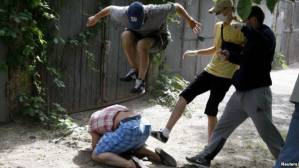• Topics / Freedom of peaceful assembly
• Topics / Prohibition of discrimination
Beaten Ukrainian gay activist unbowed

Nearby reporters captured the scene as unidentified assailants beat Svyatoslav Sheremet, the head of the Ukrainian Gay Forum, in Kyiv on May 20.
Ukrainian Gay Forum leader Svyatoslav Sheremet woke up on the morning of May 20 looking forward to the gay pride march that he and his colleagues had been planning for months. The march was the only public event the lesbian, gay, bisexual, and transgender (LGBT) community in Kyiv had scheduled to mark May 17th’s International Day Against Homophobia.
By that afternoon, Sheremet was in the hospital with bleeding in his eyes, multiple contusions, cuts, and bruises.
Sheremet tells RFE/RL that less than an hour before the march was scheduled to begin, police began questioning the organizers about the need for such an event. He says they alluded to letters of protest that had been sent to Kyiv city authorities and said, “Think about what you’re doing. There are so many people against you and we cannot guarantee your safety.” They said as many as 2, 000 right-wing radicals were planning to protest the gay pride march.
Fearful for the safety of the participants in the march, Sheremet and the other organizers called off the event.
He and a colleague briefed reporters on the scene about why the march had been canceled. Then they walked a few meters away to call for a taxi.
That’s when four men wearing surgical masks swooped down on them.
The 35-year-old Sheremet says he was surprisingly calm as he was being beaten. He says he closed his eyes, covered his face, and fell to the ground.
“Colleagues from other countries had warned us about different violent attacks that could be used against pride activists and participants. They told us how to act, which positions to assume, how to protest, " Sheremet says.
"All of this was in my head, and during the attack I caught myself thinking that this is probably something I expected. It just so happened that it was I and my colleague who ended up in this particular time and in this particular spot. This could have happened to any pride participant. Surprisingly, I didn't feel any stress.”
The clutch of reporters nearby witnessed and filmed the attack, which lasted about 30 seconds. Video and photos quickly found their way onto the Internet and were featured on several evening newscasts in Ukraine. Amnesty International condemned the incident.
Inside Ukraine, the response was muted.
Sheremet says he believes Ukrainian society is generally indifferent to the gay and lesbian community. He says most polls show that while Ukrainians may not support same-sex marriage, they also don’t support aggressive measures against gays.
The problems begin when the hard-line right-wing elements come into the picture, he says.
“The same people commit these crimes. It almost never happens that someone comes out to beat up on gays and doesn’t go and [also] beat up some other group, " Sheremet says. "This is not a problem of society's relations with the gay community; this is a problem for all of society. There is a certain aggressive element which is against many swaths of Ukrainian society. After all, all of us belong to one or another particular social group and there are no guarantees that the social group that my neighbor, who feels very safe, belongs to won't become the object of the next violent attack.”
On December 12, 1991, Ukraine became the first former Soviet country to decriminalize homosexuality. But today, the country’s government stands on the threshold of adopting legislation that would restrict the distribution of, and access to, information considered to portray homosexuality in a positive light.
A similar law has already been passed in Russia, to the dismay of rights activists.
The proposed legislation has been introduced by two members of parliament, one from the Communist Party, the other from the ruling Regions Party. Sheremet says he and his group are actively lobbying against the laws’ passage.
“We are doing everything possible to stop these laws from being passed. The Parliamentary Assembly of the Council of Europe is aware of these proposed laws; the Human Rights Council of Europe commissar is tracking this issue, " Sheremet says. "We think, however, that the European integration course that Ukraine has embarked upon considerably complicates the enacting of such senseless initiatives, which curtail the rights of one group of people in favor of another.”
Gay rights are first and foremost human rights, Sheremet says. Without even mentioning his beating, he says it was disappointing that the pride march had to be canceled.
Someday soon, he believes, under the edifying influence of European integration, Kyiv will see its first public gay pride event.
-- Irena Chalupa





